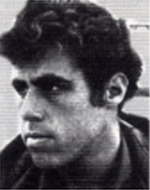Finkelstein, Moshe
Son of Zelda and Yehoshua, he was born on April 26, 1953, in Haifa, to a family of veteran residents of the city. His family called him “Moshik”. Moshe attended the “Urim” elementary school and completed his studies at the Reali School in Haifa, in the real sector. He stood out for his talents, especially his quick perception and his abstract thinking. During his high school years, Moshe was active in the Scout movement and was very popular with his friends and acquaintances in the “Wanderers” tribe. During that period he also participated in youth chess championships, where he won first places. Moshe was drafted into the IDF in August 1971 and was assigned to the Artillery Corps, where he underwent a course on technical subjects and a course for surveyors. He continued to serve as an artillery officer in the career army in command and training positions until March 1975. After that, he also studied engineering at the Technion in Haifa, and at the beginning of his studies worked for a year in a shipyard in the port of Eilat and during his studies was one of the founders of the underwater observatory In 1977. In the last year of his studies, he joined the engineers’ office in Haifa and engaged in environmental engineering, where he worked as an engineer in the same office and was involved in the planning and supervision of projects in earthworks, roads, water, sewage and purification plants. Moshe prepared plans for new settlements and fortifications in the north of the country, including Lotem and Ramot-Livnim in the Galilee, Sha’al and Ortal in the Golan, and prepared master plans for water and sewage in the Arab villages of Yafia, Deir Hanna, Araba and Sakhnin in the Galilee. When the war in Lebanon began, he was not recruited to his regular unit, but to an armored brigade that fought on the central axis in Lebanon. He participated in the Battle of Ein Zahlata as an artillery co-officer in the Armored Corps. On 3 Tamuz, June 24, 1982, Moshe was killed in a Syrian bombardment in the village of Mansuriya, while he was instructing the commanders in the field, in a battle over the Beirut-Damascus highway. He was laid to rest in the military cemetery in Haifa. After his fall, he was promoted to captain. Left parents, and a brother and sisters. In a letter of condolence to the family, the defense minister said that Moshe was “a good and professional officer, very motivated to work, with a lot of joy in life, an officer who cared.” The commander of the Artillery Corps, to which Moshe was attached during the war, wrote: “I saw Moshe during the days of the fighting that preceded his fall. I saw him with great energy, dedication and courage, always with precision, tranquility and confidence.” His parents donated a donation to the Mishkan Yaakov Yeshiva in Haifa. His classmates set up a plaque commemorating his name in the Faculty of Civil Engineering at the Technion. His co-workers set up a memorial sign at Moshav Ramot-Livnim, overlooking the Sea of Galilee.
